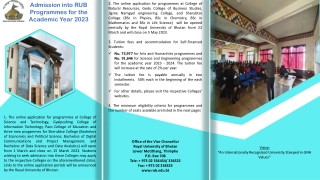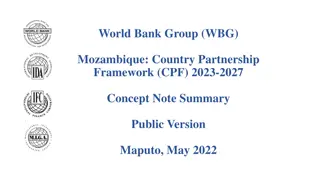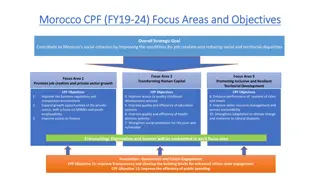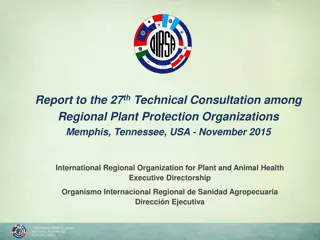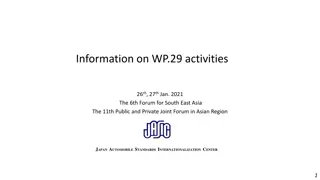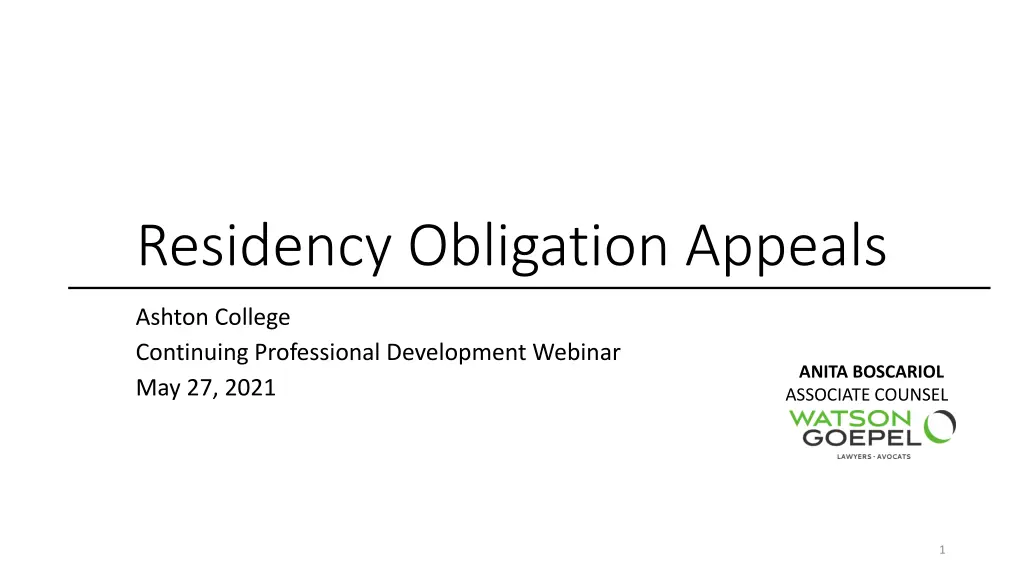
Understanding Residency Obligation Appeals for Permanent Residents in Canada
Learn about the residency obligation appeals process for permanent residents in Canada, including compliance requirements, humanitarian considerations, and scenarios where retention of permanent resident status may be justified. Discover key provisions under sections 28 and 61 of the IRPA and IRPR, as well as definitions related to Canadian businesses. Stay informed to navigate residency obligations effectively.
Download Presentation

Please find below an Image/Link to download the presentation.
The content on the website is provided AS IS for your information and personal use only. It may not be sold, licensed, or shared on other websites without obtaining consent from the author. If you encounter any issues during the download, it is possible that the publisher has removed the file from their server.
You are allowed to download the files provided on this website for personal or commercial use, subject to the condition that they are used lawfully. All files are the property of their respective owners.
The content on the website is provided AS IS for your information and personal use only. It may not be sold, licensed, or shared on other websites without obtaining consent from the author.
E N D
Presentation Transcript
Residency Obligation Appeals Ashton College Continuing Professional Development Webinar May 27, 2021 ANITA BOSCARIOL ASSOCIATE COUNSEL 1
s. 28 IRPA A permanent resident must comply with the residency obligation with respect to every 5-year period. (s. 28 IRPA) If they have been a permanent resident for less than 5 years at the time of the examination, they must demonstrate that they will be able to meet the residency obligation in respect of the 5 year period immediately after they became a permanent resident. If they have been a permanent resident for 5 years or more, that they met the residency obligation in respect of the 5-year period immediately before the examination. The officer at an examination can determine that humanitarian and compassionate considerations, considering the best interest of a child directly affected by the determination justify the retention of permanent resident status despite any breach of the residency obligation prior to the determination
s.28 IRPA Compliance with a Residency Obligation requires, with respect to a 5 year period , that for a total of 730 days (2 years) within the 5 period, the permanent resident is: 1. 2. Physically present in Canada Outside Canada accompanying a Canadian citizen who is their spouse, common-law spouse or their parent in the case of an accompanying child Outside Canada employed on a full-time basis by a Canadian business or in the federal public administration or the public service of a province Outside Canada accompanying a permanent resident who is their spouse, common-law partner or parent in the case of a child, who is employed on a full-time basis by a Canadian business or in the federal public administration or provincial public service 3. 4.
s. 61 IRPR 1. Employed on a full-time basis-means full time (as opposed to part-time, reduced days or hours, part of a year) Osba v Canada (Minister of Citizenship and Immigration) 2015 FC 1294 2. by a Canadian Business or in the public service of Canada or a province means a permanent resident must be an employee of or under contract to provide services to, a Canadian Business or the federal or provincial public service. Locally hired retained staff do not qualify) Bi v Canada (Minister of Citzenship and Immigration) 2012 FC 293 3. and is assigned on a full-time basis as a term of the employment contract to a. a position outside Canada b. an affiliated enterprise outside Canada c. a client of the Canadian business or the public service outside Canada
A Canadian business is: a. Incorporated under the laws of Canada or a province and has an ongoing operation in Canada; b. An enterprise that is not incorporated that has an ongoing operation in Canada, can generate revenue and is carried on for profit, and in which much of the voting or ownership interest is held by Canadian citizens, permanent residents or Canadian businesses as defined in (a). c. An organization or enterprise created under the laws of Canada or a province. A Canadian business does not include a business that serves primarily to allow a permanent resident to comply with their residency obligation while residing outside Canada
Assigned as a term of employment-requires that two elements be fulfilled: a. The employee works full-time on a temporary basis outside of Canada; and b. The employee will continue to work for their employer in Canada once they complete their overseas assignment See Wei v Canada (Citizenship and Immigration) 2012 FC 1084 Canada (Minister of Citizenship and Immigration) v Luo 2020 FC 543
An accompanying permanent resident (spouse, common-law spouse or dependent child) complies with the residency obligation as long as the permanent resident they are accompanying complies with their residency obligation, and as long as they are ordinarily residing with the permanent resident. (s. 61, IRPR) A dependent child is defined as a child who is not a spouse or common-law partner and is less than 22 years of age. (definition dependent child IRPR)
Failure to comply with the residency obligation can result in a removal order made by the Minister. (s. 44(2) IRPA) The removal order issued will be a departure order (s. 228(2) IRPR) Removal orders can be appealed to the Immigration Appeal Division.(s. 63 (3) IRPA)
In addition, a permanent resident outside Canada can be found to have failed to comply with the residency obligation and thus be inadmissible to Canada. (s. 63(4) IRPA) Permanent residents found inadmissible outside Canada for failure to comply with a residency obligation have a right of appeal to the Immigration Appeal Division (s. 63(4) IRPA) If outside Canada, they will be issued a travel document to come to Canada for the hearing of their appeal if they were physically present in Canada at least once within the 365 day period before their examination, if the appeal is filed within the period for making such an appeal (60 days). (s. 31 IRPR) They must state in notice of Appeal they wish to return to Canada for appeal hearing. (R. 9, IAD Rules)
Grounds of appeal: Challenge the legal validity of the determination of failure to comply with the residency obligation Humanitarian and compassionate factors considering the best interests of a child are present to warrant the granting of special relief.
Considerations in the exercise of discretionary jurisdiction in the context of failure to comply with the residency obligation factors may include, but are not limited to: the nature, extent and degree of non-compliance with the residency obligation; the reasons for and extent of the absence(s) from Canada and the appellant s intentions in relation to residency in Canada; whether the appellant made reasonable attempts to return to Canada at the first opportunity; the length of time the appellant has spent in Canada and the degree to which the appellant is established in Canada;
the continuing connections the appellant has to Canada, including connections to family members here and the hardship and dislocation to family members in Canada if the appellant ultimately ceases to be a permanent resident as a result of his or her non compliance; the degree of establishment of the appellant outside of Canada; the best interests of any child directly affected by the decision; and the degree of hardship that would be caused to the appellant by loss of status in Canada, including the conditions in the likely country of removal. ADR-will be offered by the IAD if the failure to comply was minimal and other H&C factors are present
ANITA BOSCARIOL T: +1(604) 688-1301 EMAIL: ABOSCARIOL@WATSONGOEPEL.COM 1200-1075 West Georgia St Vancouver, BC V6E 3C9 CANADA www.watsongoepel.com

